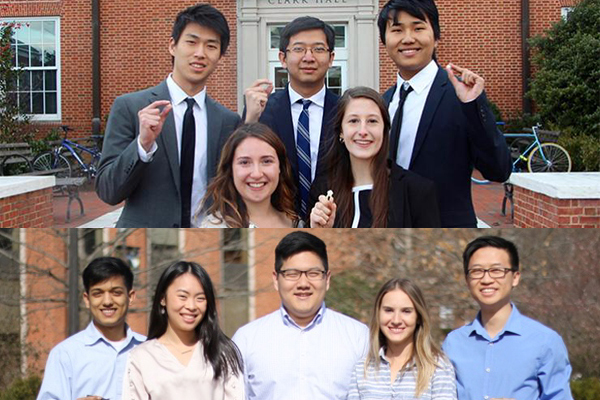Two teams of Hopkins BME undergrads among winners at MIT young inventors competition

Two teams of Johns Hopkins undergraduate biomedical engineering students are among six groups to receive a 2018 Lemelson-MIT Student Prize, which recognizes promising young inventors from around the country.
Winners, announced today, were chosen based on several factors, including the overall inventiveness of their work, the invention’s potential for commercialization or adoption, and youth mentorship experience.
The Hopkins-based AssistENT team developed a device aimed at helping people breathe easier; the Treyetech team created a device to help surgeons successfully complete corneal transplant surgery. Both teams received $10,000 awards.
“This year’s winners are the embodiment of the inventive spirit,” said Stephanie Couch, executive director of the Lemelson-MIT Program. “They have not only invented solutions to real-world problems, they are also paving the way for their peers through their mentorship. We’re excited to share their accomplishments and to continue seeing them grow.”
Team AssistENT was honored in a category for consumer devices for its comfortable and discrete nasal dilator, N-Stent. The device is designed to improve breathing for those who suffer nasal obstruction, a common problem that can cause snoring and other sleep disruptions, as well as difficulty exercising. Team members are senior Melissa Austin, sophomore Eric Cao, junior Talia Kirschbaum, sophomore Theodore Lee, and senior Harrison Nguyen.
Team Treyetech was recognized in the health care category for a device that makes corneal transplant surgery easier. About three million Americans are at risk for corneal diseases, but surgeons are hesitant to perform the only procedure that can restore vision to 20/20 because of a challenging and sometimes unsuccessful portion of the operation that involves unrolling a delicate cornea tissue graft into a patient’s eye.
The Treyetech team has created a device that prepares and transports the donor cornea graft from an eye bank to surgeons, eliminates the unrolling step, and allows for more effective and successful insertion into the eye. Team members are senior Kali Barnes, senior Stephanie Cai, sophomore Akash Chaurasia, senior Conan Chen, and senior Eric Chiang.
The Lemelson-MIT Program awards prizes annually to inventive graduate students and teams of undergraduate students from any college or university in the United States. Prizes are awarded to inventions in categories that represent significant sectors of the economy: health care, transportation and mobility, food/water and agriculture, and consumer devices.
Other winners this year represented MIT and Cornell.
